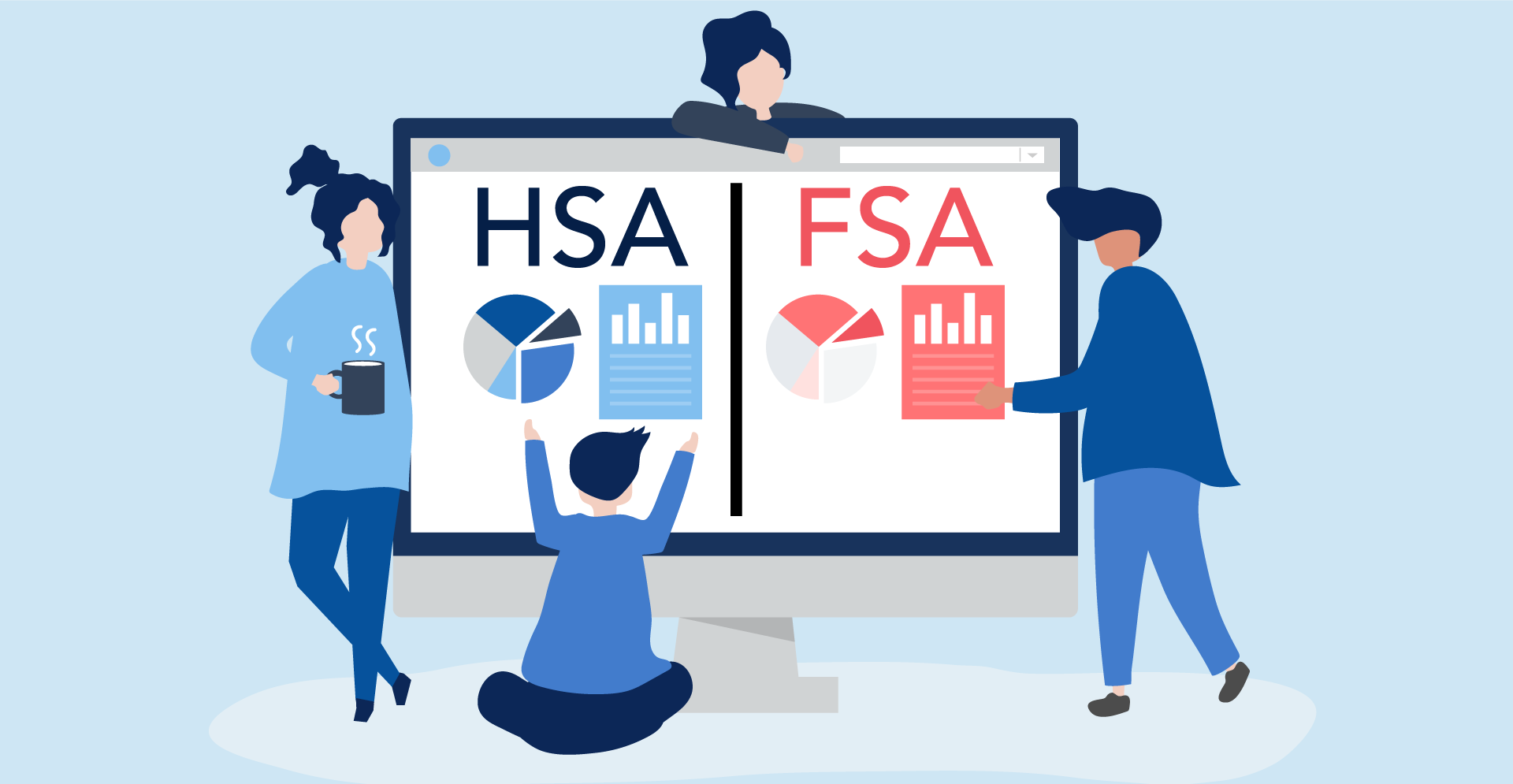
Modern healthcare can be complicated. And it doesn’t help that the healthcare system is riddled with acronyms and abbreviations that can add to the confusion.
Like with health savings accounts (HSAs) and flexible spending arrangements (FSAs). What are the differences between an HSA versus an FSA? How are they similar? Which account is best for you? If you’re not an insurance or healthcare professional, it can be hard to find clear answers to your questions regarding HSAs versus FSAs.
That’s where we come in. In one blog post, we’ll cover everything from HSA and FSA definitions, to examining their differences—some of which are quite distinct and important for you to know as you consider the type of tax-advantaged account you may want to pursue to help pay for medical expenses.
HSA and FSA Defined
When it comes to comparing HSAs and FSAs, let’s start at the beginning—defining exactly what each one is.
We’ll start with HSAs.
What is an HSA? HSA is an acronym for “health savings account.” In short, an HSA is a special type of tax-advantaged savings account that lets you put aside pretax money to pay for HSA-qualified medical expenses tax-free, now or in the future. Some of these expenses include copays or deductibles for doctor visits, prescription medications, vision care, mental health services and much more. HSAs are triple tax advantaged and only available to those who are covered under an HSA-eligible high-deductible health plan (HDHP).
Simply put, by allowing you to save pretax funds for qualified medical expenses, an HSA helps you keep more of your hard-earned money while lowering your overall healthcare costs. For more details on what an HSA is, along with how it works with an HDHP, visit Bend’s What is an HSA page.
Now, onto FSAs.
What is an FSA? FSA is an acronym for “flexible spending arrangement,” and is often referred to as a flexible spending account. An FSA is a special tax-advantaged account available to those who can receive health insurance coverage through their employer and can be funded with pretax dollars and then used to pay for certain out-of-pocket healthcare costs. Generally speaking, FSAs are much more limited in scope than HSAs.
HSAs and FSAs – Distinctly Different Accounts
While HSAs and FSAs appear similar by definition, there are some distinct differences you need to be aware of in order to make the best choice regarding which type of tax-advantaged healthcare account is right for you. Bottom line—HSAs and FSAs are NOT the same thing.
There are many critical differences that separate health savings accounts from flexible spending accounts.
HSA vs. FSA Eligibility
HSAs are an option to anyone who participates in an HSA-eligible HDHP through an employer or independently. Small business owners and those who are self-employed can also utilize HSAs, provided they are covered by a qualified HDHP. On the flipside, FSAs can only be used by employees working for an employer that offers healthcare coverage—certain small business owners and those who are self-employed can’t contribute to an FSA.
HSA vs. FSA Account Ownership and Portability
HSAs and FSAs also differ critically in terms of account ownership and portability.
With an HSA, you own the account from day one, and you keep the account even if you leave your job, change healthcare plans or retire—your HSA funds remain yours indefinitely to use for any qualified medical expenses. In fact, if you retire, you can even use your HSA funds for nonmedical expenses with no penalty.
With an FSA, your employer owns the account, and the account itself is forfeited if you leave your job—meaning you lose out on any funds remaining in your FSA.
HSA vs. FSA Rollover Capability
One of the most important differences between HSAs vs. FSAs is their rollover capability.
There’s a common misconception that all tax-advantaged accounts have certain windows (annually or otherwise) that their funds need to be used within. When it comes to an HSA, that’s not the case. HSAs allow you to roll over your unused funds indefinitely.
If you have an HSA, and even if you leave your job or the tax year ends, you’ll never be faced with a “use it or lose it” scenario when it comes to your HSA contributions. The same can’t be said for many other tax-advantaged accounts like FSAs. But when it comes to HSAs, any funds left in your HSA at the end of the year or at the time you leave your job (or retire) are able to be rolled over indefinitely with no penalties or charges.
Bottom line—if you leave your job or if your employment status changes, your HSA and all the funds within the account remain with you indefinitely.
FSAs offer more limited rollover options. An employee may be able carryover up to $500 of funds into the next year. Or the employer may offer a grace period, typically two and half months, that the prior year’s funds can be spent. It’s important for employees to review their employer’s plan documents to understand what your FSA plan offers.
HSA vs. FSA Contributions
When it comes to contribution limits, for 2020, HSAs allow up to $3,550 for those with individual coverage or up to $7,100 for those with family coverage—and if you’re 55 or older, you can contribute an extra $1,000 to either coverage option as a catch-up feature. For FSAs, the 2020 limit is $2,750 with no catch-up feature and no differentiation between individual or family coverage. As you can see, FSA contribution limits are significantly less than HSA contribution limits, especially for those with family coverage.
In terms of contribution sources, HSAs and FSAs are similar, with both allowing contributions from the employer and the employee. However, HSAs also allow for contributions from essentially anyone else who would want to contribute funds to assist with your healthcare expenses—a family member, friend or otherwise. FSAs do not allow this additional contribution source.
And when it comes to contribution changes and updates, HSAs also provide much more flexibility. With an HSA, you can change your contribution amount as many times as you’d like at any point during the year. With an FSA, you’re locked into the contribution amount you chose during your open enrollment—no additional changes or updates are allowed.
HSA vs. FSA Distributions, Withdrawals and Accessibility
Distributions, withdrawals and accessibility are additional points of differentiation between HSAs and FSAs.
HSAs offer more flexibility in terms of distributions and withdrawals, even allowing them for nonqualified expenses (though they do withhold tax and include a penalty when used for ineligible expenses). However, if you’re retired, you can make distributions and withdrawals for any expense—not just qualified medical expenses—with no penalty. When making payments out of your HSA, you don’t have to worry about submitting invoices for payments. Everything’s streamlined with an HSA.
Regarding fund accessibility, with HSAs, you can only access what’s been contributed into your account.
On the flipside, with FSAs, distributions and withdrawals are only allowed for specific healthcare expenses, and you must submit an invoice for payment for each expense. Regarding FSA accessibility, you have access to the entirety of your annual election at any time, regardless if your account is fully funded or not.
Can You Use an HSA and FSA Together?
Now that we’ve covered the main differences between HSAs and FSAs, let’s tackle one final question we hear often—whether or not you can have an HSA and FSA together at the same time, in the same year. While you’d think the answer would be a simple yes or no, it’s not quite that easy.
While in general terms, you can’t maintain an HSA and FSA at the same time, there is one caveat—the “limited-purpose” or “post-deductible” flexible spending account (LPFSA). This limited-purpose FSA is set up specifically to be used as a complement to an HSA, and serves as an additional tax-advantaged account to use for specific dental, vision and post-deductible medical expenses. The annual contribution limit of a limited-purpose FSA in 2020 matches that of a traditional FSA at $2,750, and all of the other technical account details related to an LPFSA match those of a standard FSA.
So remember, the only type of FSA that can be used in conjunction with having an HSA is an LPFSA.
HSAs – Your Choice for Flexibility, Portability and More
After reading through this post and comparing the differences between HSAs and FSAs side-by-side yourself, you’ve likely come to the conclusion that that HSAs are a better choice for just about everyone due to their flexibility, portability, infinite rollover capability and overall tax savings. And we couldn’t agree more.
So, if you’re eligible to open an HSA, consider partnering with Bend. A Bend HSA provides you with the smartest, most advanced HSA on the market, loaded with innovative, user-friendly capabilities that work for you. And best of all, a Bend HSA has no monthly fees for individuals and families. No gimmicks. No surprises. No hidden fees. Just a great HSA platform designed to make unlocking the full potential of your health savings account simple and convenient.
When you’re ready to take the next step and take control of your healthcare, open your Bend HSA.
You May Also Like
These Stories on HSA Education
Subscribe to HSA Blog
-
© Bend Financial Inc., 2019
- Privacy







No Comments Yet
Let us know what you think